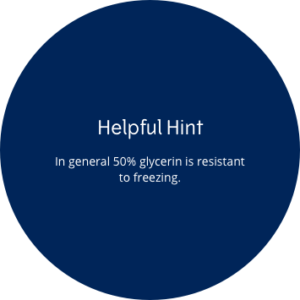Effect of Storage Conditions on Stability
Allergenic extracts should be stored in a refrigerator when not in use. The proper storage temperature is 2-8°C (36-46°F).
It is recommended to include a recording device in a refrigerator in order to monitor temperature and to note any deviations if they occur. In the event of a power failure, or any other malfunction, it will be helpful to know both the highest temperature as well as the duration of exposure.
Brief exposures to higher temperatures are assumed. It is best to think of the effects of higher temperature exposure as cumulative. One brief exposure to a higher temperature is not likely to have a significant impact but consistent temperature fluctuations over time will accelerate the loss of potency. 1-3. The expiration dates assigned assume routine use involving regular, brief exposures to ambient (room) temperatures. As long as these room temperature exposures are kept to a minimum there should not be a significant decline in potency and the assigned expiration date can be followed.
Do not freeze the extract:
If an extract becomes frozen it needs to be discarded since the freezing process may cause significant structural damage to the allergenic proteins, which may lead to precipitation or to a significant loss of potency. 1.-3. Unlike higher temperatures, which have a more predictable effect on an extract, freezing may have variable effects that prevent meaningful estimates of stability. As a precaution, it is safer to assume the frozen extract’s potency can no longer be guaranteed and that it must be replaced.
It is important that your refrigerator be set to a temperature that won’t cool the contents too much, such as the midpoint of the temperature range. If there are areas of the refrigerator that tend to be colder than others, such as directly below the point where cold air blows in, it is best to avoid placing your extracts in those places.
References:
- 1. Niemeijer, N. Effect of dilution, temperature, and preservatives on the long-term stability of standardized inhalant allergen extracts. Ann Allergy Asthma Immunol 1996;76:535-40.
- 2. ALK Internal stability study (2004) validating current shipping methods in the hottest and coldest months (worst case).
- 3. Moore, M., et al. Effects of summer mailing on in vivo and in vitro relative potencies of standardized timothy grass extract. Ann Allergy Asthma Immunol. 2010;104:147-151.


